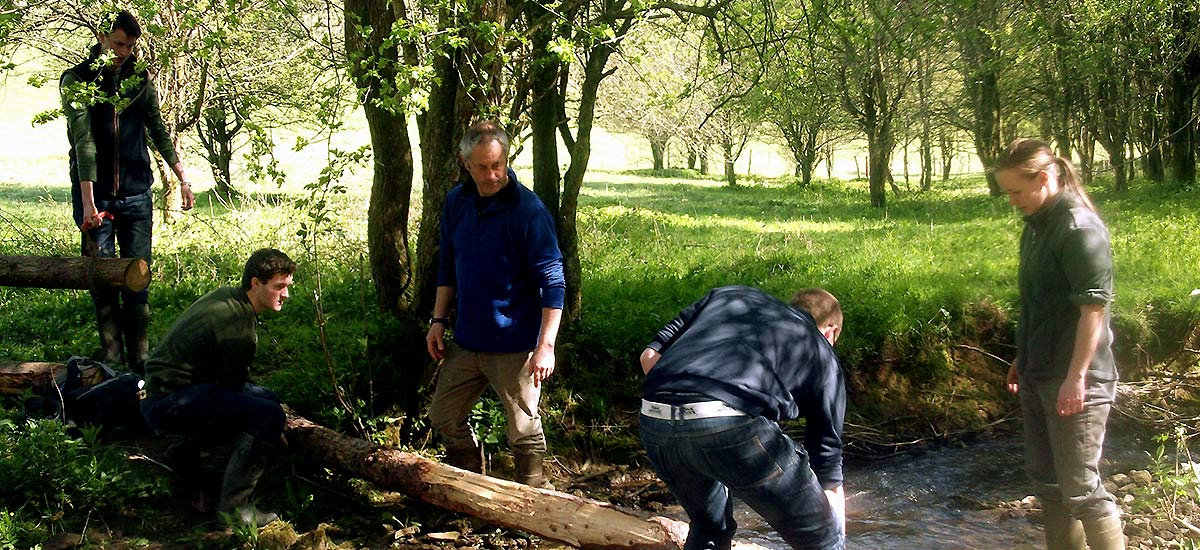BSc / BA (Hons) Environment & Sustainability (Foundation Year)
The growing awareness of environmental issues and the associated problems that individuals, society and the government are encountering means that there is increasing focus and support being given to this sector. Sustainability is at the heart of this and employers are actively seeking trained graduates with skills and knowledge in environmental sustainability. This programme provides students with a great opportunity to help fill this gap.
Course overview
This degree course with a foundation year incorporates an extra year of study at the start of your course, so that you can progress with confidence. It will develop the skills you need for your later studies. It is particularly suitable if:
- You don’t have the grades for immediate entry onto a three-year course
- You have non-traditional qualifications or experience
- You’re starting university after some time away from education
- You’re looking for more support during the transition into university study
The BSc/BA Environment & Sustainability degree will give you the opportunity to make a difference in the environmental sector. You can study by choosing to follow either a Bachelor of Science (BSc) or Bachelor of Arts (BA) route. During year one and year two all students will study the same modules and then during year three you will choose which route you wish to follow.
The key differences between the two pathways are that the BSc degree focuses more on the physical and natural science aspects, with attention given to technology, innovation and environmental management. In contrast, the BA degree is designed for those students with more interest in the social sciences and humanities, who are interested in the human, social, economic and cultural aspects of the environment and sustainability.
The BSc Environment & Sustainability will take advantage of the employment ‘environmental’ gap mentioned previously whereas the BA Environment & Sustainability will focus on the roles of people and society in solving environmental problems, giving more attention to the ‘social’ element of sustainability, alongside the environmental and economic.
Work placement
In year two of both programmes, you will apply and develop your expertise during a 15-week work placement. Not only could you find yourself working for prestigious companies in the UK or across the world, you will also develop your confidence and make a range of industry contacts.
The Integrated Foundation Year is suitable for applicants who have taken level 3 qualifications (A levels, BTEC etc.) in the UK. Overseas students who have not studied in the UK and completed their secondary education in their country, should look at taking an International Foundation Programme in order to meet the entry criteria for the degree programmes offered by the RAU.
Please note that a foundation year is not the same as a foundation degree (FdSc). A foundation year will usually lead onto a three-year degree course, whereas a foundation degree is a standalone qualification generally studied for two years.
Course content
Incorporated into the programme will be guest lectures and field visits giving you access to the latest professional developments and knowledge as well as environmental conferences and workshop, enabling you to gain insights to the various employment pathways into the environment sector, and give you the chance to network.
Timetables
Please note that while we make every effort to ensure that timetables are as student-friendly as possible, scheduled teaching can take place on any day of the week. Wednesday afternoons are normally reserved for sports and societies activities.
Modules
Each module is worth a specified number of credits. Each credit equates to 10 hours of total study time. Total study time includes scheduled teaching, independent study and assessment activity.
Full-time students normally take modules worth 60 credits per 15 week semester but this can vary depending on your elective choice. Part-time students taking proportionally fewer credits per semester. All students take a total of 120 credits per level and 360 credits for the degree as a whole. Your overall grade for your degree is based on marks obtained for modules taken at level 5 and level 6 (weighted 30:70 accordingly).
The modules available for this degree are shown below. They may change for your year of study as we regularly review our module offerings to ensure they’re informed by the latest research and teaching methods.
Foundation year
The Foundation year will provide a common core of academic and study skills sufficient to prepare you for subsequent study and academic success at undergraduate level. It will give core underpinning knowledge, skills and understanding in key areas of contemporary issues, provide underpinning subject-related skills and knowledge in key areas required for undergraduate study, including Mathematics, Numeracy and IT. It will also provide generic skills and academic knowledge to support your confidence and discipline as appropriate for higher education study and give subject-specific grounding, in terms of research topics and study focus, to support progression into degree level study in your chosen degree.
- 0IFY20 Land-use and Management: This module explores diverse land-use practices in rural and urban contexts, focusing on sustainability, policy, and stakeholder perspectives. Topics include land tenure, protected landscapes, agri-environment schemes, agroforestry, rewilding, and urban regeneration. Students engage with field visits and debates to critically assess land management strategies. Assessment includes a 1000-word professional practice report, a 2000-word problem sheet, and four short in-class tests. The module supports evaluation of land-use decisions through political, environmental, and economic lenses, encouraging evidence-based reasoning and innovative thinking.
- 0IFY21 Countryside Evolution and Development: This module explores the changing nature of countryside environments, focusing on sustainability, policy, infrastructure, and socio-economic influences. Topics include green-belt development, eco-communities, land use, and rewilding. Students examine stakeholder perspectives and develop academic skills through seminars and independent tasks. Assessment includes a collaborative group presentation with reflection (10 minutes + 500 words) and a 2500-word individual skills portfolio. The module supports critical analysis of countryside change, sustainability principles, and the impact of development across local and national contexts.
- 0IFY22 Enterprise and Marketing: This module introduces students to core business and marketing principles, including strategy, sustainability, leadership, and market segmentation. Topics cover SWOT and PESTLE analysis, CSR, and the marketing mix. Students engage with real-world case studies and multimedia tools. Assessment includes a 300-word infographic, a 5-minute video presentation, and a 1000-word reflection report. The module supports critical evaluation of enterprise success, marketing decisions, and sustainable business practices through creative and analytical formats.
- 0IFY23 Land-based Data Handling: This module develops practical and analytical skills in land-based data collection and interpretation. Topics include cartography, GIS, fieldwork, laboratory analysis, and descriptive statistics. Students explore landscape features and environmental data using mapping tools and research design principles. Assessment includes a 5-minute presentation with 500 words and a 2000-word skills portfolio with graphs. The module supports critical evaluation of land-based evidence and promotes technical proficiency in data handling across ecological and geographical contexts.
- 0IFY24 Food and Farming: This module introduces core scientific principles in agriculture, covering livestock and crop husbandry, soil health, plant biology, and farming systems such as viticulture and urban agriculture. Topics include anatomy, nutrition, disease, and sustainability across the supply chain. Students engage in fieldwork, lab practicals, and farm visits. Assessment includes a 60-minute written exam and a 2000-word professional practice report. The module supports critical evaluation of sustainable farming practices and their impact on rural business and environmental management.
- 0IFY25 Developing your Skills and Undertaking an Individual Project: This module supports students’ transition to degree-level study by developing academic, digital, and professional skills. Topics include reflection, teamwork, critical thinking, presentation, and research. Students apply these skills in a self-directed project on a topic of their choice. Assessment includes a 1500-word skills portfolio, a 500-word written reflection, a 2000-word individual project, and four short in-class tests. The module supports critical evaluation of personal development and independent inquiry in preparation for higher education.
Year one
- 4M002 Professional, Practical and Study Skills: This module develops academic, employability, and practical skills for success in university and land-based careers. It includes reflective writing, data handling, digital literacy, and hands-on tasks relevant to the sector. Students explore sustainability, industry challenges, and professional development. Assessment includes a skills portfolio, a 1000-word reflective account, and a group presentation on a sustainability challenge. The module supports self-awareness, technical competence, and a sustainable mindset.
- 4A004 Soil Science and Ecosystem Services: This module explores soil health and ecosystem services within agroecosystems and natural environments. Topics include soil formation, hydrology, ecology, chemistry, and biodiversity net gain. Students engage in lab and fieldwork, mapping, and case study visits. Assessment includes a 1500-word report with calculations and a 2-hour open book exam. The module supports critical evaluation of soil properties, environmental cycles, and the role of natural capital in supporting human wellbeing and sustainable land management.
- 4A005 Farming Systems and Sustainability: This module examines diverse farming systems including arable, livestock, mixed, organic, regenerative, and agroecological approaches. Topics include climate change, soil and water management, urban agriculture, and future farming scenarios. Students engage with farm visits, guest speakers, and case studies. Assessment includes a 10-minute recorded presentation and a 2500-word case study-based report. The module supports critical evaluation of sustainability challenges, system transitions, and agroecological practices across global and UK agricultural contexts.
- 4W003 Species Identification & Ecology: This module introduces species classification, ecological processes, and field survey techniques. Topics include taxonomy, ecosystem dynamics, biodiversity, and data analysis. Students engage in species identification, fieldwork, and ecological hypothesis testing. Assessment includes a 1.5-hour practical identification test and a 2000-word scientific report using field data. The module supports critical evaluation of species interactions, ecosystem change, and applied ecological skills.
- 4W002 People & Environmental Change: This module examines human impacts on environmental change across spatial and temporal scales. Topics include land use transitions, legislative frameworks, and sustainability challenges. Students participate in field trips and develop academic skills. Assessment includes a presentation and a 2000-word essay. The module supports critical evaluation of landscape dynamics, policy evolution, and the role of human management in shaping environmental outcomes.
- 4W001 Energy, Climate & Waste Management: This module explores the interconnections between energy systems, climate change, and pollution. Topics include renewable energy, circular economy, carbon management, and climate justice. Students engage with field trips, guest speakers, and case studies. Assessment includes a poster on regional climate impacts and a 2000-word scientific report on a renewable energy system. The module supports critical evaluation of sustainability strategies and innovation in rural and land-based sectors.
Year two
- 5M002 Research and Evidence: This module develops students’ ability to design and justify research proposals using both quantitative and qualitative methods. Topics include study design, data analysis, ethics, and communication of findings. Students engage with real-world problems and explore research applications across disciplines. Assessment includes a 2500-word research proposal and a 2-hour online test. The module supports evidence-based thinking, analytical skills, and preparation for the Level 6 dissertation.
- 5A007 Technology and Nature-Based Innovations: This module investigates the integration of digital technologies and nature-based solutions in agriculture. Topics include sensors, robotics, agroecology, carbon management, and data-driven decision-making. Students engage with field demonstrations, case studies, and industry tools. Assessment includes a 2000-word scientific report and a 2000-word case study report. The module supports critical evaluation of innovation strategies for sustainable farm management.
- 5W007 Global Development and Environmental Sustainability: This module examines the intersection of global development and environmental sustainability. Topics include climate change, resource management, environmental justice, and sustainable economies. Students engage with case studies and policy frameworks. Assessment includes a 1000-word academic poster and a 3000-word scientific report. The module supports critical evaluation of development models, sustainability strategies, and global equity across diverse contexts.
- 5M001 Industry Engagement: This module provides students with a structured industry placement to develop professional, technical, and reflective skills in a real-world context. Students complete a minimum of 444 hours of work-based learning aligned to their career goals. Assessment includes a CV and personal statement (500 words) and a reflective portfolio (1000 words). The module supports employability, self-awareness, and the application of academic knowledge in professional settings.
- 5W003 Landscape Recovery and GIS: This module explores landscape-scale conservation and ecological connectivity using GIS tools. Topics include habitat fragmentation, agri-environment schemes, and strategic countryside management. Students engage with case studies, fieldwork, and QGIS mapping. Assessment includes an academic poster and a 3000-word feasibility report. The module supports critical evaluation of landscape planning, biodiversity recovery, and spatial data application in conservation.
- 5W004 Environmental Access, Recreation and Education: This module examines how people engage with nature through access, recreation, and education. Topics include legislation, user conflicts, site management, and inclusive design. Students engage with field visits and case studies. Assessment includes two 1000-word problem sheets and a 2000-word site plan report. The module supports critical evaluation of outdoor space use, sustainability, and community wellbeing.
- 5W005 Nature Restoration and Species Reintroductions: This module explores conservation strategies for habitat restoration and species recovery. Topics include in situ and ex situ management, rewilding, population genetics, and ethical considerations. Students engage with study tours and case studies. Assessment includes an in-class test and a 3000-word portfolio. The module supports critical evaluation of conservation techniques and real-world reintroduction projects.
Year three BSc course
- 6W001 Countryside & Environmental Management: This module addresses contemporary countryside issues such as biodiversity loss, climate change, and rural development. Students explore policy, land management strategies, and sustainability through field visits and case studies. Assessment includes a 1500-word grant application, a presentation of a countryside improvement plan, and a 7-day timed assessment. The module develops applied knowledge and strategic thinking for environmental management careers.
- 6W004 Environmental & Ecological Consultancy: This module prepares students for professional consultancy roles in environmental and ecological sectors. Topics include legislation, species surveys, impact assessments, and client communication. Students engage with fieldwork, case studies, and guest lectures. Assessment includes a 2000-word literature review and a 2000-word professional practice report. The module supports critical evaluation of consultancy frameworks and the application of ecological knowledge in real-world development scenarios.
- 6W005 Climate Change & Natural Resource Management: This module explores the intersection of climate change and natural resource management. Topics include soil health, biodiversity, water systems, and sustainable agriculture. Students engage with field visits, case studies, and policy analysis. Assessment includes a poster presentation and a multiple-choice exam. The module supports critical evaluation of climate impacts, mitigation strategies, and sustainable resource use across global and local contexts.
- 6M001 Research Project: This module enables students to undertake an independent research project aligned with their subject area. Topics are student-selected and supported through supervisor meetings and workshops. Assessment includes a 5-minute progress presentation and a 12,000-word thesis or multimedia portfolio. The module supports critical evaluation, ethical research design, and evidence-based recommendations for real-world challenges.
PLUS choice of ONE elective selected from:
- 6A002 Agri-Food Systems and Policies: This module examines food systems through systems thinking and the One Health framework. Topics include food security, policy development, economics, and regenerative agriculture. Students engage with debates, case studies, and guest speakers. Assessment includes a 1000-word academic poster and a 2500-word literature review. The module supports critical evaluation of global food policy, health interconnections, and sustainable system design.
- 6L003 Forestry and Natural Resources: This module examines woodland and natural resource management in rural and urban contexts. Students explore tree identification, silviculture, ecosystem services, and natural capital. Emphasis is placed on sustainability, biodiversity, and balancing timber production with environmental benefits. Assessment includes a 2400-word woodland management plan and a 1600-word portfolio of artefacts. The module supports applied ecological knowledge, critical thinking, and sustainable land use planning.
The availability of electives to individual students will be dependent on timetabling considerations and on sufficient students electing to take part.
Year three BA course
- 6W002 Advocacy & Activism in Food and Farming: This module investigates how advocacy and activism shape food and farming systems. Topics include social justice movements, policy influence, grassroots mobilisation, and digital campaigning. Students engage with real-world case studies and field visits. Assessment includes a 1000-word essay analysing an existing campaign and a 2000-word group project developing a new advocacy strategy. The module supports critical evaluation of food systems and equips students with practical advocacy skills.
- 6W004 Environmental & Ecological Consultancy: This module prepares students for professional consultancy roles in environmental and ecological sectors. Topics include legislation, species surveys, impact assessments, and client communication. Students engage with fieldwork, case studies, and guest lectures. Assessment includes a 2000-word literature review and a 2000-word professional practice report. The module supports critical evaluation of consultancy frameworks and the application of ecological knowledge in real-world development scenarios.
- 6W005 Climate Change & Natural Resource Management: This module explores the intersection of climate change and natural resource management. Topics include soil health, biodiversity, water systems, and sustainable agriculture. Students engage with field visits, case studies, and policy analysis. Assessment includes a poster presentation and a multiple-choice exam. The module supports critical evaluation of climate impacts, mitigation strategies, and sustainable resource use across global and local contexts.
- 6M001 Research Project: This module enables students to undertake an independent research project aligned with their subject area. Topics are student-selected and supported through supervisor meetings and workshops. Assessment includes a 5-minute progress presentation and a 12,000-word thesis or multimedia portfolio. The module supports critical evaluation, ethical research design, and evidence-based recommendations for real-world challenges.
PLUS choice of ONE elective selected from:
- 6A002 Agri-Food Systems and Policies: This module examines food systems through systems thinking and the One Health framework. Topics include food security, policy development, economics, and regenerative agriculture. Students engage with debates, case studies, and guest speakers. Assessment includes a 1000-word academic poster and a 2500-word literature review. The module supports critical evaluation of global food policy, health interconnections, and sustainable system design.
- 6L003 Forestry and Natural Resources: This module examines woodland and natural resource management in rural and urban contexts. Students explore tree identification, silviculture, ecosystem services, and natural capital. Emphasis is placed on sustainability, biodiversity, and balancing timber production with environmental benefits. Assessment includes a 2400-word woodland management plan and a 1600-word portfolio of artefacts. The module supports applied ecological knowledge, critical thinking, and sustainable land use planning.
The availability of electives to individual students will be dependent on timetabling considerations and on sufficient students electing to take part.
Disclaimer information
The University has established various rules and regulations that you must agree to and follow if you accept an offer to study with us. View our full disclaimer notice.
Careers and graduate destinations
BSc degree
- Sustainability Consultant
- Project Officer
- Climate Strategy and Project Officer
- Technical Advisor
- Graduate Sustainability Consultant
BA degree
- Assistant Programme Manager
- Engagement Officer
- Farming Engagement Officer
- Project and Operations Coordinator
- Behaviour Change Officer
- Communications Intern
Entry requirements
Typical offers
Required: GCSE minimum five GCSEs at Grade C/4 including English Language and Mathematics (or Maths Numeracy for Welsh applicants) plus satisfactory level 3 qualifications:
- A-Level: (example grades EEE) – minimum of 48 UCAS tariff points across either three A-levels or two A-levels and two AS level subjects or equivalent qualifications
- C&G Advanced Technical/BTEC - Level 3 Extended Diploma (1080) at Pass-Pass-Pass
- International Baccalaureate: 24 points
- Access to Higher Education: Pass course with 45 credits at level 3 (Pass in Functional Skills level 2 are accepted in lieu of GCSE English & Mathematics)
Other level 3 qualifications will be considered.
Visit the UCAS website to calculate your UCAS Tariff points from the qualifications and grades achieved.
You may also be eligible for a contextual offer if you’re from one of our link colleges, have been in care, from a non-white ethnic background, live in an area with low progression rates to university or you are a veteran/child of an armed forces family.
Flexible entry
The University welcomes interest from applicants who may not have the standard entry requirements. A wide range of qualifications and experience are accepted in order to join University degree programmes. The University always considers evidence of personal, professional (APL) and educational experience, (APEL), which show an ability to meet the demands of their intended programme of study.
Further information
Alternative entry routes are available for a range of other qualifications. Prior experience is also considered, subject to approval by the programme manager and admissions staff.
Read more general information about our entry requirements.
If you don't meet the entry requirements of this course, you may be eligible for one of our Foundation degree courses or another related degree course.
International students will also need to achieve IELTS Academic or equivalent at the appropriate level for your programme of study. English language requirements for international students.
For any further help, please contact our admissions team:
- Email: admissions@rau.ac.uk
- Telephone: +44 (0)1285 889912
Fees
2026-27 Applicants
For the academic year 2026-27 the tuition fees for this course are:
| UK | International | |
|---|---|---|
| Full-time Foundation year | £5,760 per year | £16,950 per year |
| Full-time | £9,790 per year | £16,950 per year |
For part-time study, please contact admissions@rau.ac.uk for further information.
Please also refer to the funding your time at university page.
Tuition fees may be subject to an inflationary increase each year as set out in our Access and Participation Plan and are subject to Government and regulatory body conditions.
If you are an Irish national you can check if you meet the requirements for Home Fees. Please visit the UKCISA website and consult the pdf guide “England HE – who pays Home Fees”. First check category ‘3 years in Republic of Ireland/UK/Islands, settled in UK’ or ‘Brexit temporary offer for courses starting before 2028: Irish citizens with residence in Europe or overseas territories’. You will possibly need to be fee assessed when you submit an application for study to the RAU.
Scholarships
The University offers a wide range of generous fee waivers and bursaries. To find out more about the these, please visit the bursaries, awards and scholarships page.
Ready to take the plunge? Apply now
Applications should be made by the UCAS deadline to ensure we are able to offer you a place on your first choice course. However, if you have missed the deadline please contact Admissions@rau.ac.uk as there are usually places available.
If you would like to apply during UCAS Extra or Clearing, please check that we have places available.
Applicants wishing to study on a course on a part-time basis will need to apply directly to the RAU.
Please contact admissions@rau.ac.uk to discuss your requirements and obtain an application form.



